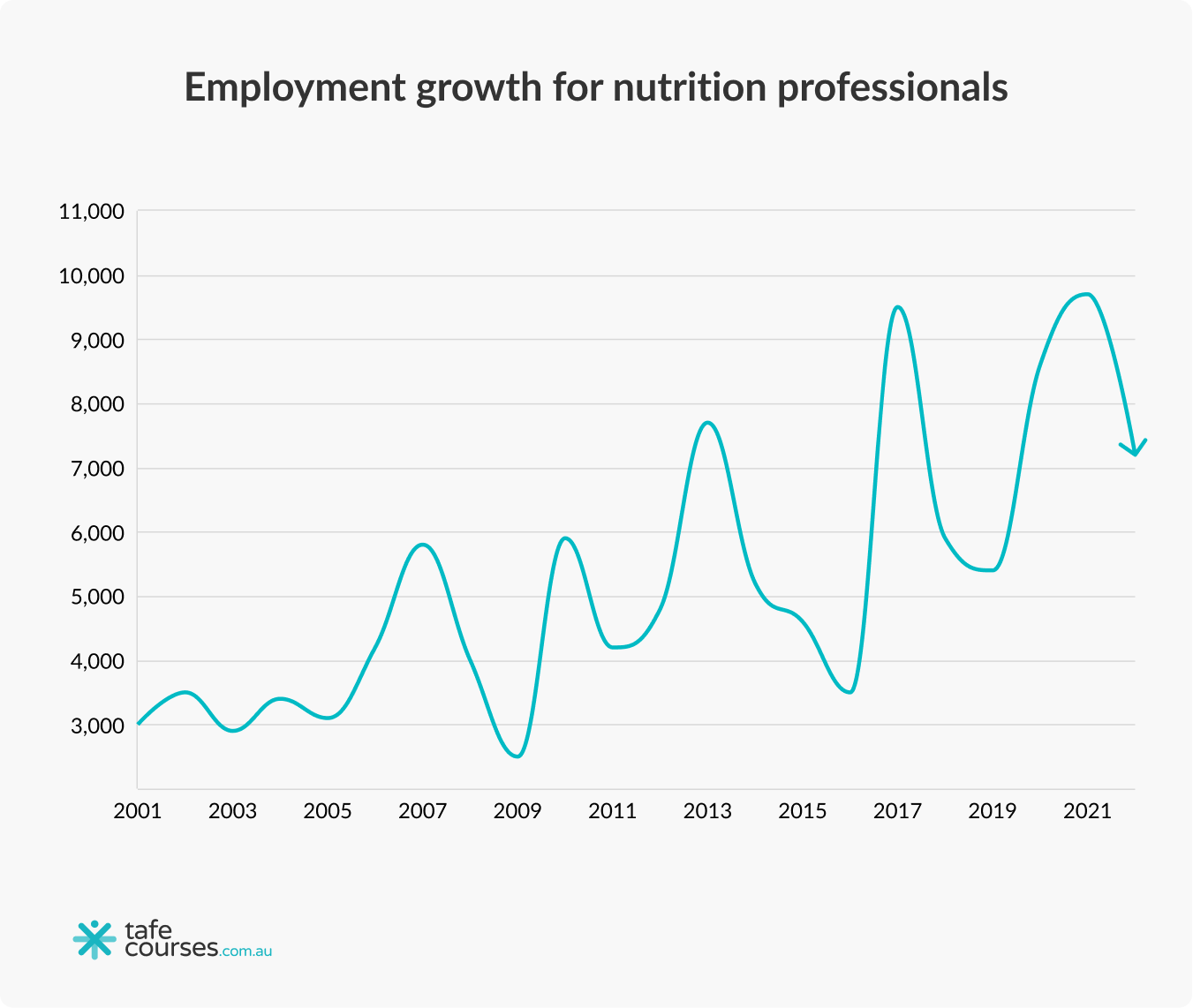Nutritionist vs Dietitian: What’s the Difference?
The difference between a nutritionist and a dietitian might seem hard to spot.
They might sound like two different terms for the same thing – professionals who offer advice in public health.

Joel Feren, Dietitian
The Nutrition Guy
“Dietitians and nutritionists apply the art and science of nutrition to help people better understand the link between food and health.
Further, they assist by encouraging dietary changes to achieve and maintain optimal health and prevent and treat illness and disease. Nutrition professionals are qualified to understand food science, interpret nutrition science, assess individual nutritional requirements, counsel on diet for ideal health or various illnesses, perform nutrition research, and instigate nutrition services and programs.”
But there are clear distinctions that separate the two career paths, and if you’re thinking of becoming a nutritionist, you should understand what they are. They have different job descriptions because their qualifications offer different types of services according to their levels of qualification.
Both have seen strong employment growth over the past 20 years.

Nutritionists vs dietitians
“In Australia, there is a clear difference between dietitians and nutritionists,” Joel says.
“Accredited Practising Dietitians (APDs) have often studied for at least four years and completed a qualification in human nutrition. They undertake supervised and professional experience in clinical nutrition, community health and food service.”
“Nutritionists do not complete this professional experience as part of their study. All dietitians are obliged to undertake regular professional development to maintain their accreditation. All APDs are considered to be nutritionists. However, nutritionists without a dietetics degree cannot assume the title of a dietitian.”

What do nutritionists do?
A nutritionist’s role is to help their clients by providing advice and encouragement. They provide a healthier lifestyle for their clients by:
While you might assume all nutritionists have undertaken an appropriate nutrition course, that isn’t always the case.
Since “nutritionist” is not a protected term in Australia, anyone can call themselves a nutritionist and offer nutrition services without any extensive qualifications.
This lack of regulation means that anyone from a nutrition graduate to someone with little nutrition training can self-proclaim their expertise. This is because there are no specific requirements that need to be met to claim the job title.
Just because the term is unregulated doesn’t mean that nutritionists are any less trustworthy or skilled – it just means that their job title doesn’t necessarily prove their extensive knowledge.
Many people employed in health and wellness – personal trainers, for example – will undertake base level nutrition courses so that they can expand the services they offer. Taking these courses means that they can help explain the basics of food science to their clients, which allows the average person to digest that information more easily.
If you’re after base level guidance for your food choices, a nutritionist can offer those services to you. However, a nutritionist can’t advise you if your needs fit outside the box. For example, if you need a tailored meal plan based on your food allergies, a nutritionist is not equipped with that level of expertise.
This situation is when you need a dietitian. Nutritionists aren’t always qualified to give dietary advice to help treat or manage specific dietary requirements or diseases, while a dietitian can. All dietitians are nutritionists, but not all nutritionists are dietitians.

What do dietitians do?
Dietitians are qualified to offer food science expertise on a more advanced level than the average nutritionist. A dietitian can offer all the same services a nutritionist can, and additionally, provide for clients by:
Dietitians are allowed to provide these more advanced services to their clients because they are required to complete a course of study in nutrition, while nutritionists are not. Additionally, dietitians have to complete at least a full year of supervised work in professional practice before being granted their position.

Joel Feren, Dietitian
The Nutrition Guy
“Both dietitians and nutritionists take a holistic approach to a client’s health and nutrition and aim to implement a healthy eating plan based on the inclusion of a variety of foods from the various food groups. However, a dietitian is best placed to provide medical nutrition advice to manage disease states.”
“I chose to become a dietitian because it afforded me more work opportunities and allowed me to have a more clinical focus.”
To qualify as an accredited practicing dietitian in Australia you have to be registered with nationally recognised bodies like the Dietitians Association of Australia or the Nutrition Society of Australia. To register with associations like DAA or NSA, you are required to meet certain standards and complete an accredited Bachelor’s degree in dietetics, qualifying you and your specialisation in food science.
As an APD, you’re qualified to work beyond the workplace of nutritionists, meaning that you can work in clinical nutrition settings, like hospitals, community health centres, and private health care facilities.
Nutritionist and Dietitian Careers in Australia: A Beginner’s Guide
Learn everything you need to know about the field of nutrition and dietetics. Discover the steps you need to take to become a nutritionist or dietitian.
Read More
Why study nutrition and dietetics?
Whether you pursue a career as a nutritionist or a dietitian is entirely dependent on where your personal interest in health and wellness lies.
If you’re into health and wellbeing but feel more compelled by the fitness side of things, pursue nutrition. Education programs can be as short as six weeks, and if you pursue a career in personal training, your nutritionist qualification will be an asset to your business.
But if it’s food science and clinical treatment that you’re fascinated by, pursue dietetics! Help people with health issues on a more advanced level, in medical nutrition.
People pursue dietetics because they love it and it shows when it comes to job satisfaction. A 2018 Victorian Dietetics Workforce Report showed that a whole 72% of dieticians intended to stay within their profession for six years plus. Getting accredited as a dietitian pays off.
Browse Nutrition Results
Diploma of Early Childhood Education and Care (VIC Only, excl. Metro) CHC50121
The Diploma of Early Childhood Education and Care qualification reflects the role of educators in early childhood education and care who work in regulated children’s education and care services in Australia. Educators at this level are responsible for...


Certificate III in Individual Support (Disability) (VIC Only, excl. Metro) CHC33021
Certificate III in Individual Support (CHC33021) qualification reflects the role of workers in the community and/or residential setting who follow an individualised plan to provide person-centred support to people who may require support due to ageing,...


Diploma of Nursing (SA and WA Only) HLT54121
Build a meaningful career that makes a difference with the HLT54121 Diploma of Nursing. This nationally recognised qualification provides the essential skills, knowledge, and practical training needed to become a qualified Enrolled Nurse in Australia....




Certificate IV in Building and Construction (Building) (VIC Only) CPC40120
If you are an aspiring or working tradesperson, here is your foundation for success. This is your first step towards starting your own building business and preparing for the builders registration. We understand that you could be a busy tradie by day,...


Graduate Diploma in Management
The Graduate Diploma in Management is an online postgraduate qualification that is ideal for busy senior managers, with a potential entry pathway through any of our Graduate Certificates and study that is highly supported, fits into your schedule, and...


Graduate Certificate in Management
The Graduate Certificate in Management is an online postgraduate qualification that is designed for newer and ambitious professionals, with entry possible through management experience alone and a study structure that easily accommodates full-time work...


Diploma of Building and Construction (Building) (VIC Only) CPC50220
Prepare for registration as a Builder with the Diploma of Building and Construction (Building) (CPC50210) Gain the skills & knowledge to run your own business Study when it suits you – online & on campus options available...


Certificate IV in Plumbing and Services (VIC ONLY) CPC40920
This course covers common skills for the plumbing industry as well as specialist streams relevant to gasfitting, drainage, sewerage, roof drainage and more....


Building Leadership Programme (VIC ONLY) CPC40110 ,CPC502110
BAA is proudly partnered with Victoria University to offer our students higher education opportunities. Whether students are after an alternative way to gain entry into a degree, or simply want to try out a study path so they can confirm their longer-t...


Bachelor of Dance Education (NSW Only)
The Bachelor of Dance Education is a unique specialist professional qualification and is Australia’s first–being delivered through ACPE! Units are provided by highly qualified and experienced professionals, empowering you with all the knowledge and ski...


Bachelor of Education (Physical & Health Education) (NSW Only)
The Bachelor of Education (Physical & Health Education) incorporates units in movement and health as well as curriculum and pedagogical studies, equipping you with the requisite skills for entering the teaching profession. If you are keen to pursue...


Associate Degree of Sport Business (NSW Only)
Get a higher education qualification in two years when studying full-time! Based on the Bachelor of Sport Business in terms of content, the Associate Degree of Sport Business offers students the opportunity to get into the workforce quicker or alternat...


Bachelor of Dance Practice (NSW Only)
The Bachelor of Dance Practice is a specialised degree that will equip you with the skills and experience to become a professional in the dance industry. The course develops artistry, choreography, performance, educational, business, and organisational...


Bachelor of Health Science (Exercise) (NSW Only)
The Bachelor of Health Science (Exercise) offers the perfect career path for those looking to enhance their knowledge and skills through further studies in physiotherapy, exercise physiology, and other health professions. You will come to understand ho...


Bachelor of Sports Coaching (Strength and Conditioning) (NSW Only)
To address the high demand for sport coaches and professionals in Australia, the Bachelor of Sport Coaching (Strength and Conditioning) is a specialist degree fostering the coaching, administrative, and professional skills necessary for a fulfilling ca...


Bachelor of Sport Business (Leadership)
Turn your passion for sport into a career by immersing yourself in a degree that will broaden your theoretical and technical knowledge, so that you are fully equipped fora management role within the sport industry. The Bachelor of Sport Business (Leade...


Certificate IV in Ageing Support (VIC Only, excl. Metro) CHC43015
Certificate IV in Ageing Support (CHC43015) reflects the role of support workers who complete specialised tasks and functions in aged services; either in residential, home or community based environments. Workers will take responsibility for their own...


Certificate III in Fitness SIS30321
If you’re looking to begin your career in the fitness industry, studying the SIS30321 Certificate III in Fitness is the perfect qualification to get you started. Gain all the knowledge and skills you need to enter the industry as a Gym Instructor or Gr...


Personal Trainer Course SIS30321,SIS40221
Join the fitness industry as a Personal Trainer and turn your love for fitness into a rewarding career by graduating in both the SIS30321 Certificate III in Fitness & SIS40221 Certificate IV in Fitness. Enjoy the flexibility of being your own boss...


Certificate IV in Fitness SIS40221
Take the next step in your career and gain the qualification you need to become a Personal Trainer. If you currently work in the fitness industry as a Gym or Group Fitness Instructor, elevate yourself to the next level by studying the SIS40221 Certific...





